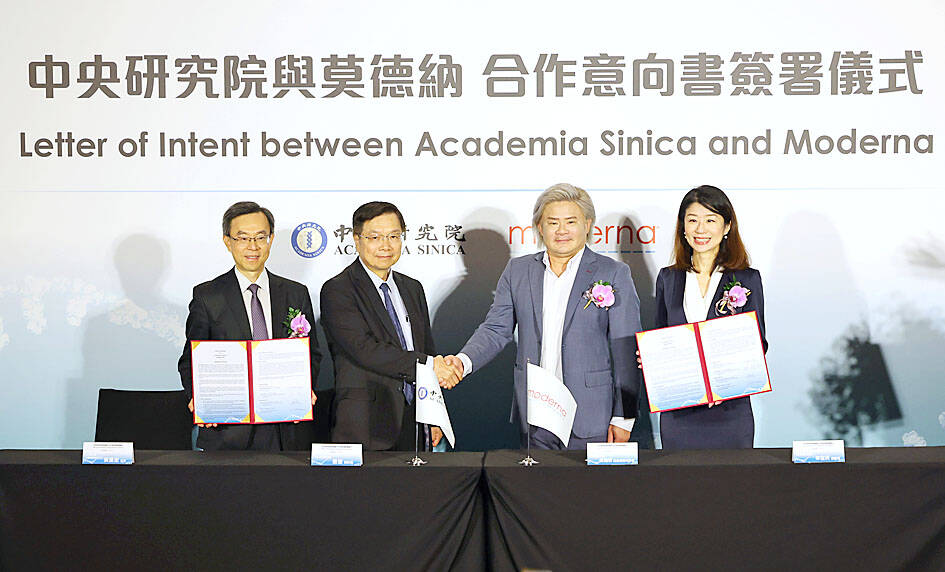Academia Sinica and vaccine developer Moderna Inc yesterday announced a five-year strategic partnership to jointly develop messenger ribonucleic acid (mRNA) technology and cultivate research talent in Taiwan.
A letter of intent signed by the two parties includes plans to establish an mRNA technology and vaccine research and development (R&D) platform where start-ups can demonstrate their products and conduct exchanges, Academia Sinica said in a press release.
The partnership’s first venture will be an mRNA innovation awards program to select five research teams or individuals, with Moderna providing winners a cash prize of NT$500,000 (US$16,265) and guidance from the company’s experts, Moderna Taiwan general manager Joyce Lee (李宜真) said.

Photo: CNA
Applicants can submit proposals in any of the following five areas — infectious diseases, rare diseases, immuno-oncology, cardiovascular diseases and autoimmune diseases — from Friday next week to the end of next month.
Through cooperation with Academia Sinica, Moderna Taiwan hopes that more mRNA research would be conducted to explore more possibilities of mRNA applications and find innovative solutions to the healthcare challenges facing the world, while developing technology to improve disease prevention and clinical treatment, Lee said.
Taiwan is the only Asian country where Moderna is conducting clinical trials for its flu vaccine, she said.
Moderna Taiwan hopes to bring the most effective medicines and vaccines to Asia, and become a talent incubation hub in the region in preparation for the next pandemic, she added.
Academia Sinica vice president Tang Tang (唐堂) said that the research academy formed its first mRNA vaccine research and development team at the end of 2020, using its mRNA pilot research facility to develop vaccine candidates for early clinical trials.
On-site verification of the mRNA pilot research facility is expected to be completed by the end of this year and start a small-scale trial production trial by the industry and academia next year, Tang added.
Tang said that Academia Sinica’s Biomedical Translation Research Center, which is part of the National Biotechnology Research Park, has helped 59 companies, including 13 publicly listed companies, with a total market value of about NT$350 billion, accounting for 29 percent of the total market value of the biomedical industry in Taiwan.

CHIP WAR: Tariffs on Taiwanese chips would prompt companies to move their factories, but not necessarily to the US, unleashing a ‘global cross-sector tariff war’ US President Donald Trump would “shoot himself in the foot” if he follows through on his recent pledge to impose higher tariffs on Taiwanese and other foreign semiconductors entering the US, analysts said. Trump’s plans to raise tariffs on chips manufactured in Taiwan to as high as 100 percent would backfire, macroeconomist Henry Wu (吳嘉隆) said. He would “shoot himself in the foot,” Wu said on Saturday, as such economic measures would lead Taiwanese chip suppliers to pass on additional costs to their US clients and consumers, and ultimately cause another wave of inflation. Trump has claimed that Taiwan took up to

A start-up in Mexico is trying to help get a handle on one coastal city’s plastic waste problem by converting it into gasoline, diesel and other fuels. With less than 10 percent of the world’s plastics being recycled, Petgas’ idea is that rather than letting discarded plastic become waste, it can become productive again as fuel. Petgas developed a machine in the port city of Boca del Rio that uses pyrolysis, a thermodynamic process that heats plastics in the absence of oxygen, breaking it down to produce gasoline, diesel, kerosene, paraffin and coke. Petgas chief technology officer Carlos Parraguirre Diaz said that in

Japan intends to closely monitor the impact on its currency of US President Donald Trump’s new tariffs and is worried about the international fallout from the trade imposts, Japanese Minister of Finance Katsunobu Kato said. “We need to carefully see how the exchange rate and other factors will be affected and what form US monetary policy will take in the future,” Kato said yesterday in an interview with Fuji Television. Japan is very concerned about how the tariffs might impact the global economy, he added. Kato spoke as nations and firms brace for potential repercussions after Trump unleashed the first salvo of

SUBSIDIES: The nominee for commerce secretary indicated the Trump administration wants to put its stamp on the plan, but not unravel it entirely US President Donald Trump’s pick to lead the agency in charge of a US$52 billion semiconductor subsidy program declined to give it unqualified support, raising questions about the disbursement of funds to companies like Intel Corp and Taiwan Semiconductor Manufacturing Co (台積電). “I can’t say that I can honor something I haven’t read,” Howard Lutnick, Trump’s nominee for commerce secretary, said of the binding CHIPS and Science Act awards in a confirmation hearing on Wednesday. “To the extent monies have been disbursed, I would commit to rigorously enforcing documents that have been signed by those companies to make sure we get